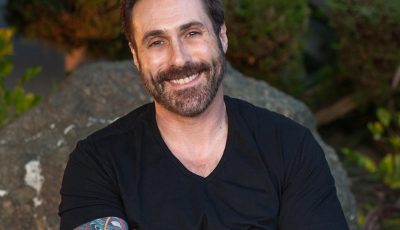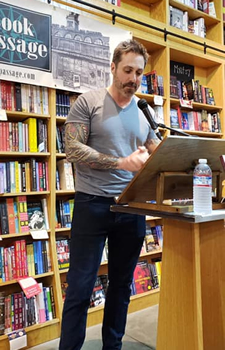

Up Close: Joe Clifford
On the Job Training
 By Dawn Ius
By Dawn Ius
Ten years ago, you’d have been hard-pressed to find Joe Clifford reading a novel written by a woman. Nothing against female writers, of course. He just hadn’t exposed himself to books other than those written by men.
These days, it’s quite the opposite.
Clifford admits he’ll drop just about anything—even a game of golf, his go-to sport—to dive into a new Wendy Walker, Mary Kubica, Gillian Flynn, or Jennifer Hillier novel. These are some of the female authors he says are currently slaying it in the category of psychological domestic suspense—and they’re the books that resonate with him the most.
So much so that his new release, THE LAKEHOUSE, a standalone novel that straddles the line between domestic suspense and mystery, is inspired by his love of them.
“In some ways, it’s kind of on-the-job training,” he says. “My Jay Porter books—I can write those fairly easily. With Jay, that disgruntled, affected version of me—I can write about that character for the rest of my life. I just don’t want to keep doing the same thing. But I also don’t have the domestic suspense writing chops of a Gillian Flynn or Mary Kubica.”
It’s true, Clifford took some risks. THE LAKEHOUSE is an outstanding read, rife with suspense, while remaining true to Clifford’s raw literary style—when it comes to writing, he’s got more than enough “chops.” But he’s quick to acknowledge that the readers who love THE LAKEHOUSE are not necessarily the same as those who consume his Jay Porter books.
“It’s not a smart habit, but I read reviews all of the time,” he says. “And this is a very divisive book. This is a business, and you have to keep aware of shifting demographics. You can’t close your eyes and throw at a dartboard. That’s not how this works. You have to stay true to you, true to your voice, and authentic—but at the same time, you have to recognize there are some rules, some tropes, and I know formula is a bad word, but there is a formula to this stuff as well.”
Clifford admits he may have violated some of those rules with THE LAKEHOUSE. The story takes place in a small lakefront town, where divorced mom Tracy Somerset literally bumps into Todd Norman during a late-night Walmart run. Todd is a charming, handsome former Wall Street financier—and a man accused of murdering his wife.
Their romantic relationship is one of the points of contention in reader reviews—could a woman truly fall in love with a man believed to have committed such a horrific crime?
Clifford makes a compelling case for their romance.
“I think I proved how it would happen, and I think Tracy’s feelings for Todd are organic, but it was a challenge,” he says. “I really wanted to put the love story up front because that’s something I try to do—I like soap operas. I grew up on them.”
Guiding Light, in particular, in case you were curious.
But romance wasn’t the only storytelling tool Clifford picked up from watching those daytime dramas—soap opera fans are more than familiar with those Friday afternoon cliffhangers. Novels of suspense use a similar tactic.

Clifford visits Liberia Mucho Mojo bookstore in Florence during a 2018 tour of Italy. Photo credit: Rich Rice
“Every chapter of a book has to end with something that makes you want to find out what happens next,” Clifford says. “And each alternating POV has to hinge on that moment.”
In THE LAKEHOUSE, we are introduced to three main characters, aside from Todd: Tracy, Sheriff Duane Sobczak, and Dr. Meshulum Bakshir, the town psychiatrist. Fans of Clifford’s work will know he tends to base the characters in his books off people he knows in real life—and THE LAKEHOUSE is no different.
The sheriff is based off a guy Clifford went to school with, Uncle Bob takes after a preacher from Clifford’s home town named “Uncle Bob,” and Tracy is loosely based on a girl Clifford was in love with growing up.
“She’s probably the most authorial character creation in the book,” he says, noting that she was also the most challenging to write—though not because she was more “made up” than the rest. “The real trick is writing from a female’s point of view. You don’t want to spend 15 minutes writing about breasts, which is what men tend to do. You know, ‘She walked down the stairs boobily’ or whatever.”

Clifford reads from his 2019 thriller The One That Got Away at San Francisco’s Book Passage. Photo credit: Justine Clifford
Not to fear—Clifford does a good job of making sure Tracy is authentically female, another testament to his command of the craft. That doesn’t mean he isn’t continuing to learn and do better. Every book, he hopes, is better than the last.
“I blended some genres in this book more than I might with the next one,” he says. “But maybe that’s not true. Maybe I’ll do the same thing next time because that’s the book I want to write. I want as broad a readership as possible, but not at the expense of being able to write what I want to write. Otherwise, I might as well go and get a job at a factory.”
That’s not happening any time soon. Clifford, who writes about two books a year, pandemic or not, is currently shopping a new novel called Say My Name, a “true crime” style book that takes us back to the Jay Porter universe, albeit in a unique way, and just last month, started work on a new novel.
“In this profession, you’re always hoping for the home run,” he says. “But there are so many things outside your control. The only thing you can control is to keep writing.”
- On the Cover: Alisa Lynn Valdés - March 31, 2023
- On the Cover: Melissa Cassera - March 31, 2023
- Behind the Scenes: From Book to Netflix - March 31, 2023

